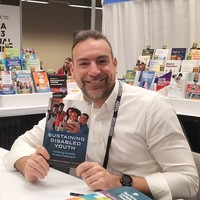Papers by Mary Theresa Kiely

The majority of students with special needs or disabilities (SWDs) spend most of their school day... more The majority of students with special needs or disabilities (SWDs) spend most of their school days in general education classrooms (U. S. Department of Education, 2012). Successful inclusion of SWDs in general education classrooms is dependent, therefore, on both general and special education teachers’ knowledge, skills and collaboration (Brownell et al., 2012). Teachers, however, may hold different beliefs about how to support included students. SWDs may require more and different kinds of support than other students (Fuchs, Fuchs, & Compton, 2012); whether or not they get this support often depends on the individual teacher and, likely, the teacher’s beliefs (Jordan, Glenn & McGhie-Richmond, 2010).
Because teachers’ beliefs about SWDs seem to have a strong influence on their actions in the classroom, they are important to understand (Borko & Putnam, 1996; Calderhead, 1996). The challenge in studying beliefs, however, is that they are complex. Teachers hold beliefs about curriculum, the nature of content, students and what they bring to the classroom, their role in helping students, and their own efficacy in helping different types of students (Richardson, 1996). How these different sorts of beliefs are at work in the minds and actions of special and general education teachers is important to examine because teachers’ actions affect whether SWDs are able to progress successfully.

Research supporting collaborative learning groups has resulted in their widespread use; however, ... more Research supporting collaborative learning groups has resulted in their widespread use; however, there are few recommendations on how individual teachers can maximize other group members’ learning opportunities or their own learning. We used Gee’s (2005) discourse analysis method to
study how special education teacher discourse provided learning opportunities related to reading professional development (PD) within a collaborative group setting. Findings led to the specification of a Learning Facilitation Discourse Model. According to this model, teachers
whose discourse is indicative of: a) high levels of knowledge related to PD content and b) a strong inclination toward inquiry provide more opportunities for other group members to learn about strategies for both applying PD content and integrating it with their students’ needs. This Discourse Model can help teacher educators and teachers themselves structure collaborative learning groups to maximize learning opportunities.
... OF TEACHERS Julian G. Elliott and Steven E. Stemler 75 THE IMPACT OF NO CHILD LEFT BEHIND ON ... more ... OF TEACHERS Julian G. Elliott and Steven E. Stemler 75 THE IMPACT OF NO CHILD LEFT BEHIND ON SPECIAL EDUCATION TEACHER SUPPLY AND THE PREPARATION OF THE WORKFORCE Paul T. Sindelar, Erica D. McCray, Mary Theresa Kiely and Margaret ...

Learning …, Jan 1, 2011
This article presents the findings from a pilot study exploring the use of video as a self-reflec... more This article presents the findings from a pilot study exploring the use of video as a self-reflection tool combined with high-quality, collaborative professional development (PD). Participants were in-service, upper-elementary, special education instructors teaching word study and fluency to students with learning disabilities. Participants watched multiple video-recordings of their instructional practice throughout one school year and reflected on their video by: rating their instruction, noting what worked, and making suggestions for future lessons. Findings indicated that teachers' self-reflections changed from overestimations of their practice to more critical self-examinations. Their comments initially were vague but became more descriptive over time. Four teacher groups emerged in the analysis, ranging from teachers who did not believe they needed to improve their practice to teachers who became instrumental in conducting their own research about what worked in their practice. Overall, video self-reflection combined with high-quality PD was a positive tool for enhancing teacher change.

General education teachers support the inclusion of students with disabilities, but researchers h... more General education teachers support the inclusion of students with disabilities, but researchers have found supports for students with disabilities in general education settings to be less than adequate. How teachers make decisions about supporting the learning of included students with disabilities is not well understood and may well be driven by teachers’ own beliefs. A better understanding of the relationship between secondary teachers’ beliefs and their practices for supporting students with disabilities is critical for efforts to help teachers improve their practice. Four secondary level general education language arts teachers were interviewed and observed 4 times to investigate how their beliefs were related to practices to support students with disabilities. Data were analyzed according to guidelines for grounded theory; the grounded theory was expressed as a series of proposition statements related to the core phenomenon of negotiating support for included students with disabilities. The propositions delineated relationships between teachers’ beliefs and practices found in this dataset (Strauss & Corbin, 1990). Teachers’ beliefs about the content area, the needs of students with disabilities and their own roles and responsibilities influenced their practices for providing support for their included students with disabilities. The results have implications for researchers, teacher educators, professional development providers and administrators seeking to influence teachers’ practice in the area of supporting students with disabilities within general education classes.
Exceptional Children, Jan 1, 2010
… Thomas Scruggs (ed.) …, Jan 1, 2008











Uploads
Papers by Mary Theresa Kiely
Because teachers’ beliefs about SWDs seem to have a strong influence on their actions in the classroom, they are important to understand (Borko & Putnam, 1996; Calderhead, 1996). The challenge in studying beliefs, however, is that they are complex. Teachers hold beliefs about curriculum, the nature of content, students and what they bring to the classroom, their role in helping students, and their own efficacy in helping different types of students (Richardson, 1996). How these different sorts of beliefs are at work in the minds and actions of special and general education teachers is important to examine because teachers’ actions affect whether SWDs are able to progress successfully.
study how special education teacher discourse provided learning opportunities related to reading professional development (PD) within a collaborative group setting. Findings led to the specification of a Learning Facilitation Discourse Model. According to this model, teachers
whose discourse is indicative of: a) high levels of knowledge related to PD content and b) a strong inclination toward inquiry provide more opportunities for other group members to learn about strategies for both applying PD content and integrating it with their students’ needs. This Discourse Model can help teacher educators and teachers themselves structure collaborative learning groups to maximize learning opportunities.
Because teachers’ beliefs about SWDs seem to have a strong influence on their actions in the classroom, they are important to understand (Borko & Putnam, 1996; Calderhead, 1996). The challenge in studying beliefs, however, is that they are complex. Teachers hold beliefs about curriculum, the nature of content, students and what they bring to the classroom, their role in helping students, and their own efficacy in helping different types of students (Richardson, 1996). How these different sorts of beliefs are at work in the minds and actions of special and general education teachers is important to examine because teachers’ actions affect whether SWDs are able to progress successfully.
study how special education teacher discourse provided learning opportunities related to reading professional development (PD) within a collaborative group setting. Findings led to the specification of a Learning Facilitation Discourse Model. According to this model, teachers
whose discourse is indicative of: a) high levels of knowledge related to PD content and b) a strong inclination toward inquiry provide more opportunities for other group members to learn about strategies for both applying PD content and integrating it with their students’ needs. This Discourse Model can help teacher educators and teachers themselves structure collaborative learning groups to maximize learning opportunities.